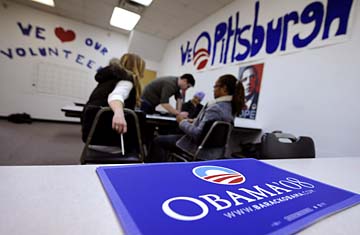
A regional staff member for Barack Obama's presidential election campaign briefs volunteer callers in Pittsburgh, Pennsylvania.
"New voter registration figures" aren't everybody's idea of a good time, but voting experts pore over obscure and apparently random registration data the way seismologists measure tiny movements in the earth's crust in order to predict when an earthquake is coming.
And just this week, Rhodes Cook, who writes for Larry Sabato's Crystal Ball, published an invaluable study that is the best glimpse yet of who is likely to be voting this fall. Cook did a deep dive in the new registrations from the 29 states that collect that data by party and found, in effect, that about 1,000,000 people have left the Republican party since 2004, while another 700,000 voters have become Democrats.
A hodgepodge change of 1.7 million registrations in about half the states may not sound significant in a nation that could see 110 million people vote in November, but it is, in fact, something that looks potentially seismic. A close look at Cook's data explains why some Democrats smell realignment this fall. In the core Democratic states, as you might expect, registration among Democrats is booming. California has enrolled 300,000 new Democrats and only 15,000 new Republicans since the spring. But, while that shift could have an impact in congressional races, it won't change that state's 55 electoral college votes, which have been in the Democratic column since 1992.
But in some battleground states for which new registrations by party are available, there is a comparable shift underway. Iowa, the most important swing state in the upper Midwest, has seen Democratic registration grow by about 68,000 since 2004 while Republican registration has dropped by nearly 27,000. (Bush won the state by about 10,000 votes in 2004.) In New Hampshire, which Kerry won in 2004 by about 9,000 votes, Democratic registration is up by 35,000 while new Republican voters number less than 2000. In Nevada, which Bush won by 21,000, Democrats have enrolled 16,000 new voters. Republicans have lost more than 43,000. Does it mean Obama will win these states? No. Does it make it easier to capture them? Certainly.
* * *
Cook's data makes clear that it's not all skittles and beer for the Dems: their registration tallies are falling in some potentially crucial states (New Mexico and Colorado). But even where they are falling, they tend to be falling more slowly than Republican registrations. Which means, most likely, not all — or even most — of these disappearing republicans are becoming dems. It is much more likely that they are simply becoming independents.
And it is those independent voters who are in motion that Obama needs to capture if he is to win. One longtime Republican analyst, who was worked on just about every GOP presidential campaign for a generation, commented this week that Obama was on his way to making the sale to some number of persuadable independent voters in June and early July when he began to stumble. What appeared to be confusing — and in some cases contradictory — policy statements on Iraq, FISA and the Supreme Court decision on guns, in the view of this analyst, "froze" a number of independent or unaligned voters who were on their way to, if not supporting Obama, than at least trying to get more comfortable with him. His poll numbers skidded a bit when that happened.
"Those remarks put that sale on hold," this analyst said. "It doesn't mean he can't win them over eventually. But it reminded them that he might be just another politician, not the magical, inspirational, agent of change they had been hearing about. And if he keeps that sort of thing up, he will lose them for good."
* * *
All this gives rise to at least one more question: If most of those million fleeing Republicans have become tenuous independents, then who are those 700,000 new Democrats? That is what the DNC is trying to find out. "They are young, they are female, they are new to the process," said a consultant who is trying to dissect this new group for the party elders. "Most of them have come out of nowhere."
Key to Obama's game plan this summer is to take that 700,000 in 29 states and then triple or quadruple that figure by the time registration closes in the fall. That is why his Chicago headquarters is moving what is believed to be an army of several thousand volunteers into the field in each of as many as 18 states this summer to boost registrations further. And the $50 million Obama announced this week that he raised in June will help pay for that effort.
Obama is taking no chances: if he can't convince a growing number of disaffected Republicans and unaligned independent voters that he shares their values and deserves their votes, he will find a new group of voters who do.
